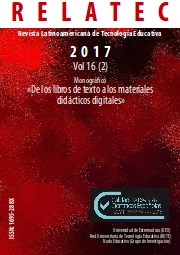Some issues on the building of an information and documentation curriculum: displacements and digital challenges
DOI:
https://doi.org/10.17398/1695-288X.16.2.127Keywords:
Information Literacy, Teaching, Information, Curriculum, Schook Knowledge, DocumentaryAbstract
Abstract
The project for the creation of an information and documentation curriculum covers the training trajectory of the student and the student from the elementary school to the university. Twelve basic to develop an informational and documentary curriculum from the definition of information literacy terms, streamlining and systematization of its contents, progressive ways of teaching, learning sequential planning, formalizing school knowledge objects are exposed, the aims and objectives of information relating to information technology and communication, information activities, skills teaching and learning, teacher training, relationship with other disciplines, functions of evaluation. It is concluded that the issue of a global education for a culture of information and media remains more than ever crucial. But the challenge and the urgency of training students and students for an information culture should not take the importance out of research on these issues. In the perspective of a info-documentary curriculum, the relations, already close and between the field or didactic field and that of the research, will necessarily be reinforced and deepened.
Downloads
References
American Library Association (2000). Information Literacy Competency Standards for Higher Education. Recuperado a partir de http://www.ala.org/Template.cfm?Section=Home&template=/ContentManagement/ContentDisplay.cfm&ContentID=33553
Behrens, S. (1994). A Conceptual Analysis and Historical Overview of Information Literacy. College and Research Libraries, 55(4), 309-322.
Cellard, A. (1997). L’analyse documentaire. En J. Poupart (Ed.), La recherche qualitative: enjeux épistémologiques et méthodologiques (pp. 251-271). Montréal: Morin.
Daunay, B. (2007). Évaluation. En Y. Reuter (Ed.), Dictionnaire des concepts fondamentaux des didactiques. (pp. 185-189). Bruxelles: De Boeck.
Delcambre, I. (2007). Évaluation. En Y. Reuter (Ed.), Dictionnaire des concepts fondamentaux des didactiques. (pp. 105-110). Bruxelles: De Boeck.
Develay, M. (1992). De l’apprentissage à l’enseignement: pour une epistemologie scolaire. Paris: ESF.
D’Hainaut, L. (1977). Des fins aux objectifs de l’éducation. Paris: Nathan.
Eisenberg, M; Lowe, C Spitzer, K. (2004). Information Literacy: Essential Skills for the Information Age. Syracuse University, New York: ERIC Clearinghouse on information and technology.
Lahanier-Reuter, D. (2008). Situations didactiques. Y. Reuter (Ed.), Dictionnaire des concepts fondamentaux des didactiques. (Pp. 203-207). Bruxelles: De Boeck.
Morandi, F; & La Borderie, R. (2006). Dictionnaire de Pédagogie. 120 notions-clés. 320 entrées. Paris: Nathan.
Nöel, E. (2007). (Coordinadora). Ressources Electroniques Pour les Etudiants, la Recherche et l’ Enseignement. Villeurbanne: ENSSIB-Service FORMIST.
Owusu-Ansah, E. (2003). Information Literacy and Higher Education: Placing the Academic Library in the Center of a Comprehensive Solution. College and Research Libraries, 30(1), 3-16.
Rader, H. (2002). Information Literacy 1973-2002: A Selected Literature Review. Teaching and Assessing Information Skills in the Twenty-first Century: A Global Perspective . (pp. 242-259). University of Illinois at Urbana-Champaign LibraryLarge-scale Digitization Project, 2007.
Stiegler, B. (2008). Prendre soin. I. De la jeunesse et des générations. Paris: Flammarion.
Serres, A. (2010). (Ed.). Culture informationelle et didactique de l’information. Síntesis de los trabajos del Groupe de Recherche sur la Culture et la didactique de l’Informartion. 2007-2010. Rennes: Erte-Urfist.
Van Der Maren, J-M. (1996). Méthodes de recherche pour l’éducation. Bruxelles: De Boeck.
Van Der Maren, J-M. (2003). La recherche appliquée en pédagogie. Des modelés pour l’enseignement, Bruxelles: De Boeck.
Downloads
Published
Issue
Section
License
Authors who publish in this journal accept the following conditions:
1. The Author retains copyright in the article. Upon acceptance of the article, the author shall grant to the Publisher the right of first publication of the article. with the dcoument registered with the Creative Commons Attribution-NonCommercial-NoDerivative 4.0 International (CC BY-NC-ND) license, which allows to third parties to use what is published whenever they mention the authorship of the work and the first publication in this journal.
2. Authors can make other independent and additional contractual agreements for the non-exclusive distribution of the article published in this journal (eg, include it in an institutional repository or publish it in a book) provided they clearly indicate that the work was published for the first time in this journal.
3. Authors are allowed and recommended to publish their work on the Internet (for example on institutional or personal pages) before and during the review and publication process, as it can lead to productive exchanges and a greater and faster diffusion of published work (see The Effect of Open Access).









